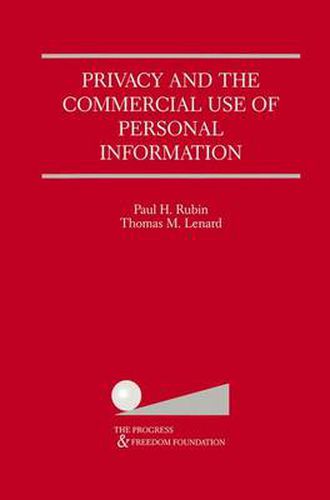Readings Newsletter
Become a Readings Member to make your shopping experience even easier.
Sign in or sign up for free!
You’re not far away from qualifying for FREE standard shipping within Australia
You’ve qualified for FREE standard shipping within Australia
The cart is loading…






This title is printed to order. This book may have been self-published. If so, we cannot guarantee the quality of the content. In the main most books will have gone through the editing process however some may not. We therefore suggest that you be aware of this before ordering this book. If in doubt check either the author or publisher’s details as we are unable to accept any returns unless they are faulty. Please contact us if you have any questions.
Hon. Orrin G. Hatch United States Senate Electronic commerce will be pivotal to the United States economy in the 21 SI Century. With the advent ofelectronic commerce, some consumers have become concerned about the disclosure, transfer, and sale of information which businesses have collected about them. These concerns purportedly are slowing the rate ofexpansion ofelectronic commerce, thereby putting at risk the future growth of the New Economy. To reduce this risk, a variety of schemes have been proposed under which the government would regulate online privacy. Congress currently is in the midst ofa vigorous debate as to whether the government should regulate on-line privacy standards, and, ifso, what form such regulation should take. This succinct yet powerful book by Paul Rubin and Thomas Lenard goes to the heart of these issues. It explains that there is no evidence of actual consumer harm or market failure that could justify burdensome government regulation of online privacy. It describes the tremendous advantages consumers currently receive from the free flow of information collected on line, advantages which could be eliminated if the government unnecessarily regulates and stops this flow of information. It argues that the free market provides businesses with compelling incentives to adopt their own measures - such as seal programs and novel technologies - to assuage consumer privacy concerns. This book presents compelling evidence to support these and many other points central to the continuing debate in the halls of Congress and elsewhere concerningonline privacy.
$9.00 standard shipping within Australia
FREE standard shipping within Australia for orders over $100.00
Express & International shipping calculated at checkout
This title is printed to order. This book may have been self-published. If so, we cannot guarantee the quality of the content. In the main most books will have gone through the editing process however some may not. We therefore suggest that you be aware of this before ordering this book. If in doubt check either the author or publisher’s details as we are unable to accept any returns unless they are faulty. Please contact us if you have any questions.
Hon. Orrin G. Hatch United States Senate Electronic commerce will be pivotal to the United States economy in the 21 SI Century. With the advent ofelectronic commerce, some consumers have become concerned about the disclosure, transfer, and sale of information which businesses have collected about them. These concerns purportedly are slowing the rate ofexpansion ofelectronic commerce, thereby putting at risk the future growth of the New Economy. To reduce this risk, a variety of schemes have been proposed under which the government would regulate online privacy. Congress currently is in the midst ofa vigorous debate as to whether the government should regulate on-line privacy standards, and, ifso, what form such regulation should take. This succinct yet powerful book by Paul Rubin and Thomas Lenard goes to the heart of these issues. It explains that there is no evidence of actual consumer harm or market failure that could justify burdensome government regulation of online privacy. It describes the tremendous advantages consumers currently receive from the free flow of information collected on line, advantages which could be eliminated if the government unnecessarily regulates and stops this flow of information. It argues that the free market provides businesses with compelling incentives to adopt their own measures - such as seal programs and novel technologies - to assuage consumer privacy concerns. This book presents compelling evidence to support these and many other points central to the continuing debate in the halls of Congress and elsewhere concerningonline privacy.